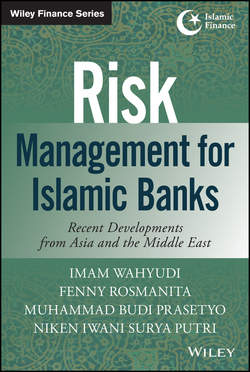Читать книгу Risk Management for Islamic Banks - Imam Wahyudi - Страница 19
На сайте Литреса книга снята с продажи.
Part One
Introduction
Chapter 2
The Islamic Bank and Risk Management
Risk and Return Trade-Off
ОглавлениеProfit can only have its lawfulness admitted if it is accompanied by risk, effort, and responsibility done. This principle is in line with the hadith “al ghunmu bil ghurmi” (profit accompanies risk) and “al-kharaju bidh-dhamani” (income is received by taking a responsibility). This principle is in line with the concept of risk-return trade off that is already known in finance. Each party involved in a transaction has the right to a certain level of return because of their willingness to bear the corresponding amount of risk. In other words, every risk received by parties in a transaction should also have the possibility of being compensated with adequate level of return.
In the Islamic bank, the contract used can be grouped into two. The first group consists of contracts with a social purpose (tabarru') and contracts with a profit motive (tijari). The use of both types of contracts in a banking transaction generates a direct consequence to the application of the concept of risk and return. In a tabarru' contract, like a loan (qardh), the principle of risk-return trade-off cannot be applied, because it violates the principle of “al ghunmu bil ghurmi.” The capital owner in a loan contract (qardh) does not bear any risk from the loan given to the debtor. If the capital owner insists on charging the borrower with additional debt, then that addition is usury, making it into unlawful wealth. But what about the use of a sales contract (tijari') in which the client does not pay in a lump-sum payment, but in periodical installments? In that contract, the principle of risk-return trade-off is practiced when the murabahah contract is entered into. As a seller, the Islamic bank buys the object that becomes the transaction object from a supplier to then sell it again (with the agreed-upon margin) to the customer. The Islamic bank then faces the various risks associated with the ownership of that object. It is from the Islamic bank's willingness to bear the risk of owning the object that it gains the right to set the margin that is appropriate to compensate for that risk, and thus risk-return trade-off can be applied equally. But after the murabahah contract is over and is then continued with a loan contract (because the customer is unable to pay in cash), the size of the debt owed should refer to the exact amount in the murabahah contract, minus the down payment already paid beforehand. The Islamic bank is not allowed to request additional payment that can cause the total amount paid for the object to exceed the amount agreed upon in the murabahah contract.
